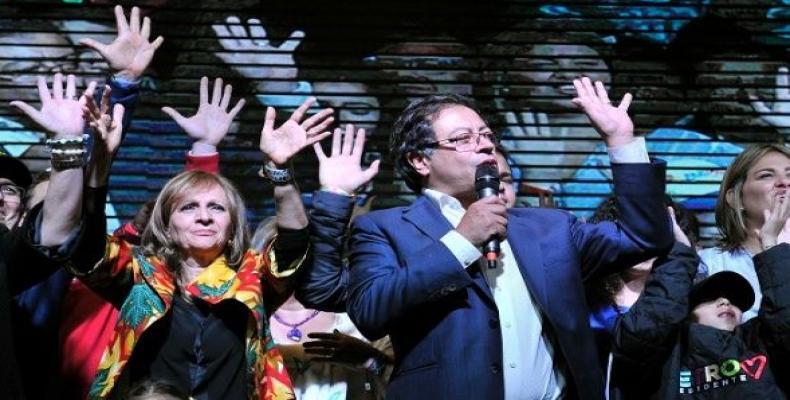Bogota, June 19 (RHC)-- In Colombia, the center-left former presidential candidate Gustavo Petro, who ended up in second place in Sunday's presidential runoff, asserted his impact in the elections by winning in the poorest zones of the country, which tend to be mostly Indigenous and Afro-Colombian, as well as in the capital Bogota.
In the first round in May, Petro won in poor sectors such as La Guajira, Atlantico, Sucre, Cordoba, Choco, Cauca, Nariño, Putumayo and Vaupes. However, he lost La Guajira and Cordoba to the right-wing Ivan Duque in the second round. In Choco, the poorest department in Colombia, Petro got almost 60 percent of the votes.
This time he also won in Bogota, Colombia's capital city, with 53.35 percent of the votes after the centrist candidate Sergio Fajardo beat him in the first round.
"What defeat? Eight million Colombians free and standing. There is no defeat here. For now, we will not be the government," tweeted Petro when the media outlet Caracol Radio called his election a loss.
Petro had run on a political platform appealing to the poorest sectors of society and farmers, with projects and plans aiming to reactivate the fields, redistribute the land and center the economy on agriculture.
Violence against Colombia’s Indigenous Nasa within the Cauca province, which Petro won, is so rampant that the country’s Constitutional Court was forced to declare the tribe "at risk of extermination" in 2016.
The lack of governance in the area has allowed illegal miners who want access to tribal land to displace approximately 20,800, kill around 650, injure 550 and disappear 100 between 1996 and 2016, according to El Tiempo. Petro had vowed to protect land activists who continue to be murdered and has been a strong opponent of illegal extractive industries.
Petro also found coastal support where the country’s poorest, rural, Afro-descendant, and Indigenous populations suffer from the highest rate of inequality in the country, which includes the departments of Nariño, Cauca, Valle and Choco.
These were also the regions where the majority voted in favor of the 2016 peace agreement that Petro had pledged to uphold as well as the regions in which he vowed to protect land rights activists. Ivan Duque, on the other hand, voted against the peace accords and has outlined how he’ll reverse several of its chapters, which could likely bolster paramilitary murders.
Petro had also proposed free and public education for everybody, and to promote art and culture, giving attention to Colombia's most abandoned sectors.
Gustavo Petro lost the elections but secured 41.81 percent of the votes to Duque's 53.98 percent, and said he will defend the project of a different Colombia by being part of the opposition as a senator.
Gustavo Petro won in Colombia's poorest, Indigenous and Afro-Colombian Regions


